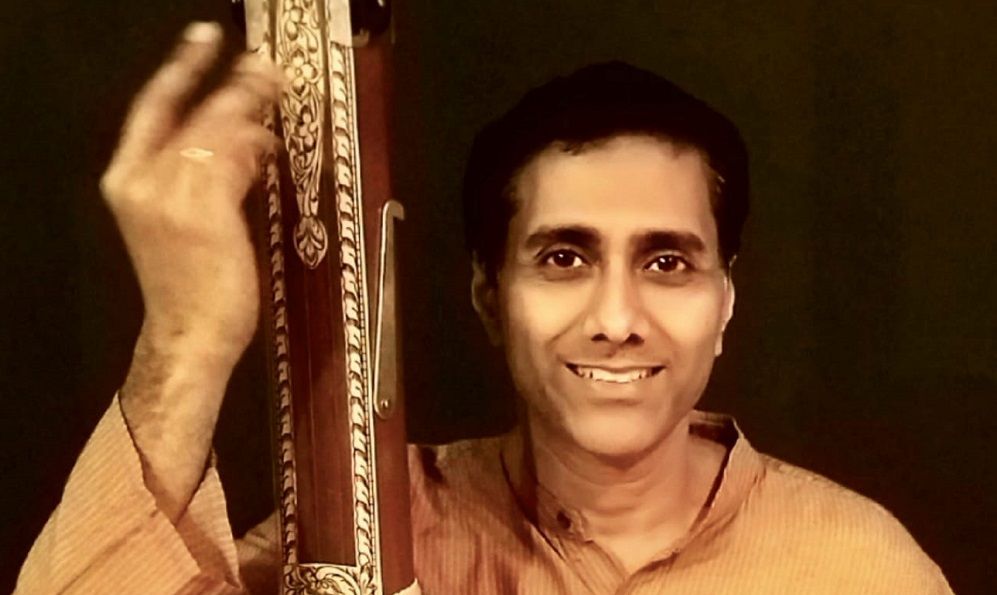Washington University’s critical care physician Dr Sanjay Subramanian speaks on his ways of maintaining artistic creativity through Carnatic music.
Amid the anxieties over Covid-19, Dr Sanjay Subramanian finds solace in Carnatic music while being a medical practitioner in the US. As the global pandemic is nearing a year of spread, Subramanian’s parallel engagement with classical vocal keeps his spirit alive.
Subramanian, a critical care physician at Washington University in St Louis, not just sings south Indian classical. He associates with various cultural festivals in America, regularly organising workshops for students in the riverine city that houses the varsity in Missouri state and gives lecture-demonstrations focusing manodharma sangeetham which is a vital key to imaginative music, helping one to improvise a lot in the five-century-old Carnatic music.
Subramanian is the founder and president of Abhinay School of Music at St. Louis. The institution has been providing training in Carnatic music and is known for its new crop of young practitioners.
“Music is my passion, my love. It helps me destress from the long hours at the hospital. It enables me to be alert all the time and concentrate better,” says the doctor, who was raised in Delhi and has roots in Tamil Nadu down the Asian country.
On road practice sessions
Dr Subramanian’s duty-hours in the US have of late become erratic following the pandemic outbreak of the novel coronavirus. “I need to stay long in the hospital, remain awake several nights together. Sometimes my work lasts for 24 hours at a stretch,” he reveals.
All the same, the physician finds time to practise music. “I do it whenever and wherever. My sessions in voice culture largely happen while I drive. I do it using digital shruti apps,” he reveals. “People at the crossroads me give strange looks at times, but you can’t afford to mind it much.”
This kind of a lesson is a far cry from young Sanjay’s trysts with Carnatic music in the Indian capital way back in the early 1980s. He had initial vocal training under musician SV Ramani, a disciple of 20th-century titan Maharajapuram Vishwanatha Iyer. Later, he learned under Lakshmi Ramaswamy, whose guru was Mysore Vasudevachar (1865-1961).
“My mother sings. My father was a keen listener of music,” says Dr Subramanian. His ancestral village on the paternal side is around Tirunelveli, an urban centre known for its imposing Nellaiappar temple with the deity of Shiva revered in 7th-century Tevaram devotional poetry.
Sanjay, towards the end of his teenage, had an opportunity to spend four years in Tamil Nadu. That was to study medicine in Vellore, 140 km west of the state’s capital of Chennai. After finishing his MBBS degree at the Christian Medical College, Sanjay left the country. He flew to the US in 1995 to do a residential programme in medicine.
A quarter-century thence, Dr Subramanian has gained a lot of wisdom in medical science — least letting his interest in Carnatic slide. “The med school course and residency have always been highly challenging. However, self-motivation and practice help me focus on music as well,” he says.
Major musical turn
The physician’s artistic journey took a decisive turn in 2002 when he met scholar-vocalist Neyveli R Santhanagopalan. “He taught me numerous compositions. And enabled me to develop a finer sensitivity about Carnatic music,” he says . “My guru convinced me about the importance of learning veena-based pathantharam. His encouragement prompted me to teach music….at Seattle. I have groomed students to perform concerts.”
Subramanian, who has been performing in Chennai regularly since 2007, has also learnt compositions from another legent PS Narayanaswamy, who died in mid-October this year. In 2016, the expat musician organised a Carnatic choir in Greater Seattle area, featuring 100 participants.
Since early this year, Covid-19 has brought a lot of changes in the lives of people around. “We dearly miss all our art festivals and music programmes,” he says. All live performances and major Carnatic music events, including the Cleveland Thyagaraja Aradhana, stand cancelled. “For us expatriates, such festivals are occasions for social gathering as well. And, of course, a means to explore our culture and identify more with it.”
This year, the non-resident Indian musicians, dancers and art-lovers will miss their excitement of performance and appreciation in Chennai as well. For, the 2020 Margazhi Maha Utsavam will be a tame affair vis-à-vis its typical bustle.
“Margazhi builds an atmosphere that you simply cannot replicate anywhere else no matter how hard you try,” says Subramanian. “That said, performers have now skilfully leveraged the power of technology to stay connected with their art and rasikas.”
Also Read: TM Krishna presents Narayana Guru’s verses


1 Comment
Excellent. Real interest on music. I like listening music. Sir you may be knowing Paalam radio which provides 24hours program. Nambirajan R